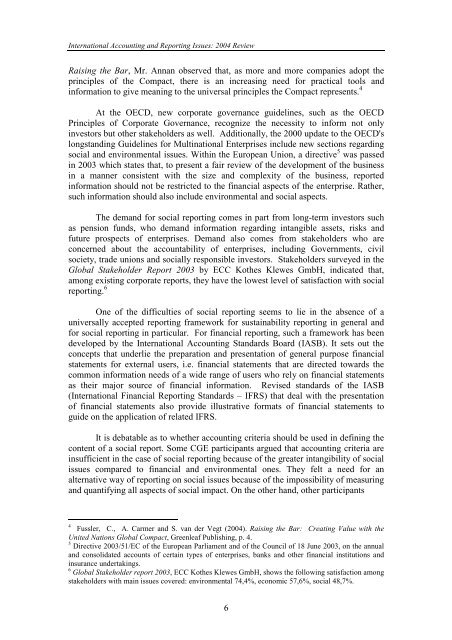International Accounting and Reporting Issues: 2004 Review - Unctad
International Accounting and Reporting Issues: 2004 Review - Unctad
International Accounting and Reporting Issues: 2004 Review - Unctad
Create successful ePaper yourself
Turn your PDF publications into a flip-book with our unique Google optimized e-Paper software.
<strong>International</strong> <strong>Accounting</strong> <strong>and</strong> <strong>Reporting</strong> <strong>Issues</strong>: <strong>2004</strong> <strong>Review</strong><br />
Raising the Bar, Mr. Annan observed that, as more <strong>and</strong> more companies adopt the<br />
principles of the Compact, there is an increasing need for practical tools <strong>and</strong><br />
information to give meaning to the universal principles the Compact represents. 4<br />
At the OECD, new corporate governance guidelines, such as the OECD<br />
Principles of Corporate Governance, recognize the necessity to inform not only<br />
investors but other stakeholders as well. Additionally, the 2000 update to the OECD's<br />
longst<strong>and</strong>ing Guidelines for Multinational Enterprises include new sections regarding<br />
social <strong>and</strong> environmental issues. Within the European Union, a directive 5 was passed<br />
in 2003 which states that, to present a fair review of the development of the business<br />
in a manner consistent with the size <strong>and</strong> complexity of the business, reported<br />
information should not be restricted to the financial aspects of the enterprise. Rather,<br />
such information should also include environmental <strong>and</strong> social aspects.<br />
The dem<strong>and</strong> for social reporting comes in part from long-term investors such<br />
as pension funds, who dem<strong>and</strong> information regarding intangible assets, risks <strong>and</strong><br />
future prospects of enterprises. Dem<strong>and</strong> also comes from stakeholders who are<br />
concerned about the accountability of enterprises, including Governments, civil<br />
society, trade unions <strong>and</strong> socially responsible investors. Stakeholders surveyed in the<br />
Global Stakeholder Report 2003 by ECC Kothes Klewes GmbH, indicated that,<br />
among existing corporate reports, they have the lowest level of satisfaction with social<br />
reporting. 6<br />
One of the difficulties of social reporting seems to lie in the absence of a<br />
universally accepted reporting framework for sustainability reporting in general <strong>and</strong><br />
for social reporting in particular. For financial reporting, such a framework has been<br />
developed by the <strong>International</strong> <strong>Accounting</strong> St<strong>and</strong>ards Board (IASB). It sets out the<br />
concepts that underlie the preparation <strong>and</strong> presentation of general purpose financial<br />
statements for external users, i.e. financial statements that are directed towards the<br />
common information needs of a wide range of users who rely on financial statements<br />
as their major source of financial information. Revised st<strong>and</strong>ards of the IASB<br />
(<strong>International</strong> Financial <strong>Reporting</strong> St<strong>and</strong>ards – IFRS) that deal with the presentation<br />
of financial statements also provide illustrative formats of financial statements to<br />
guide on the application of related IFRS.<br />
It is debatable as to whether accounting criteria should be used in defining the<br />
content of a social report. Some CGE participants argued that accounting criteria are<br />
insufficient in the case of social reporting because of the greater intangibility of social<br />
issues compared to financial <strong>and</strong> environmental ones. They felt a need for an<br />
alternative way of reporting on social issues because of the impossibility of measuring<br />
<strong>and</strong> quantifying all aspects of social impact. On the other h<strong>and</strong>, other participants<br />
4 Fussler, C., A. Carmer <strong>and</strong> S. van der Vegt (<strong>2004</strong>). Raising the Bar: Creating Value with the<br />
United Nations Global Compact, Greenleaf Publishing, p. 4.<br />
5 Directive 2003/51/EC of the European Parliament <strong>and</strong> of the Council of 18 June 2003, on the annual<br />
<strong>and</strong> consolidated accounts of certain types of enterprises, banks <strong>and</strong> other financial institutions <strong>and</strong><br />
insurance undertakings.<br />
6 Global Stakeholder report 2003, ECC Kothes Klewes GmbH, shows the following satisfaction among<br />
stakeholders with main issues covered: environmental 74,4%, economic 57,6%, social 48,7%.<br />
6

















